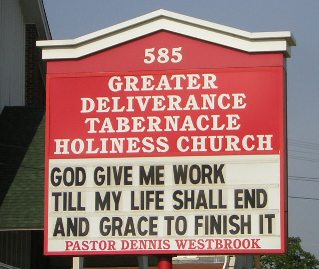
Neither party has an economic plan that puts the lowly or even the middling first. Republicans venerate “job creators,” which functions as a pet name for the wealthy. Democrats purport to speak for the middle class but are mostly inarticulate when it comes to labor unions and policies to promote a living wage. And, neither party has much to say about poverty.
Truth be told, the American bishops themselves have scarcely put the poor and downtrodden “at the center” of their own election-year discourse. All year they’ve been absorbed in a campaign launched on the shaky premise that government and notably Barack Obama are trampling upon their religious rights. One prelate who has tried to plot a different course is Bishop Stephen Blaire of Stockton, California, who made headlines this past spring for critiquing Paul Ryan’s budget plan, in his capacity as chairman of the hierarchy’s Committee on Domestic Justice and Human Development. In that role he has now offered up the Labor Day statement.
“Despite unacceptable levels of poverty, few candidates and elected officials speak about pervasive poverty or offer a path to overcome it,” says the 2012 message issued by the U.S. Conference of Catholic Bishops under Blaire’s name. “We need to hear from those who seek to lead this country about what specific steps they would take to lift people out of poverty.”
Channeling John Paul
As it should, the statement cites the 1981 papal encyclical Laborem Exercens (“On Human Work”), in which Pope John Paul II spoke of unions as “an indispensable element of social life.” This encyclical letter is really all that a Catholic, qua Catholic, needs to understand about human dignity in the workplace. It is also one of the most elegant philosophical meditations on work ever written.
Laborem Exercens is almost too radical to discuss in polite company. Its operative theme is “the priority of labor over capital,” words that would provoke the “class warfare” police if uttered by a politician today. The papal message is that money and machines, the stuff of capital, must serve the worker, not the other way around.
The encyclical also described work as “a key, probably the essential key, to the whole social question.” John Paul had a profoundly radical way of expressing this idea. “The basis for determining the value of work is not primarily the kind of work being done, but the fact that the one doing it is a person,” he wrote in a line that is humanistic with a vengeance.
For John Paul, a living wage—enough to support a worker and a family—was a given. In Catholic social parlance it is a “minimum requirement” of justice, the least that work should do for us. But more than that, work is a deeply social activity, as limned by the Polish pope. Even a lone craftsperson is drawn into a larger nexus of work, because he or she uses tools others have made from raw materials. “In working,” the pope wrote, “man enters into the labor of others.” (Yes, the exclusive pronouns are distracting though what you’d expect from a mid-to-late 20th century Eastern European.)
Co-operating with the Creator
As John Paul often said, institutions can foster these human ties in the workplace. Above all, he commended the role of unions, “not only in negotiating contracts, but also as ‘places’ where workers can express themselves. They [unions] serve the development of an authentic culture of work,” he said a decade later in his encyclical Centesimus Annus (marking “100 Years” of modern Catholic social teaching).
The pontiff did not stop at that leftward point. He tacked further in that direction, arguing in Centesimus that when corporations engage in such tactics as “the breaking of solidarity among working people”—in other words, union busting—they are essentially forfeiting their right to ownership.
From a strictly theological view, John Paul also saw dignified work as a way of cooperating with God in the continued unfolding of Creation. In Genesis, God planted a garden and instructed his children to fill it with good things. Human work of all kinds is the primordial way in which human beings follow this call: “In carrying out this mandate, man, every human being, reflects the very action of the Creator of the universe,” he wrote in Laborem Exercens.
Most of these meditations fall outside of what would be considered prudent discourse in American politics today. Some politicians, namely Obama, might be accused of harboring beliefs like the illegitimacy of ownership in some circumstances, but hardly anyone visible on the national stage actually thinks this way. And that includes, on roughly 364 days a year, the American Catholic hierarchy. …read more





